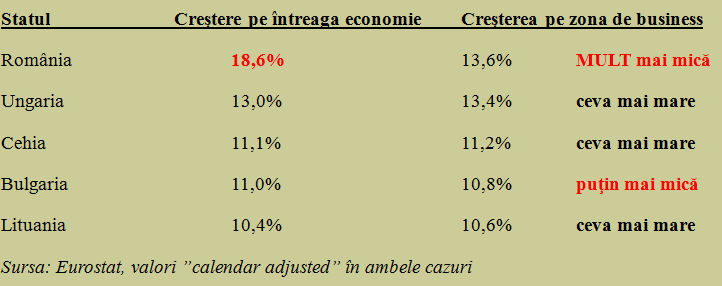 Romania ranks first in the EU by labour cost increase in the second quarter of 2017, at a high distance from the following states, with no less than + 18.6% for the entire economy, according to a press release by Eurostat.
Romania ranks first in the EU by labour cost increase in the second quarter of 2017, at a high distance from the following states, with no less than + 18.6% for the entire economy, according to a press release by Eurostat.
Behind us are Hungary (+ 13.0%), the Czech Republic (+ 11.1%), Bulgaria (11.0%) and Lithuania (+ 10.4%).
It should also be noted that the labour cost increase across the EU was only 2.2% and only 1.8%. in the Eurozone. In other words, the labour cost increase rate was more than ten times higher in relation to the Eurozone. This will affect the attractiveness for foreign investments looking for a low-wage environment. Which will need to be replaced by other facilities such as infrastructure, business environment, and so on.
In addition, the increase in labour costs cannot be reflected in the production costs and in the future price increases, beyond the influx of money in the market that will have to find its match in the supply of goods, from wherever they come, whether from the domestic production or imports.
Romania, growth on an opposite trend than others: much in state, little in business
Apparently, we have entered a trend occurred in the former socialist states that have joined the EU after the transition to the capitalist market economy. A more pronounced trend for the states that have adopted a controlled floating exchange rate and not joined yet the European single currency.
In fact, a closer look at the detailed figures provided by Eurostat gives us an extremely important signal that we should analyse with the utmost responsibility for the future of the country. If we adapt the European ranking for the WHOLE economy just to the business sector, the situation is changing.
*
- Country increase as the level of entire economy increase in the business sector
- Romania much lower
- Hungary slightly higher
- The Czech Republic slightly higher
- Bulgaria much lower
- Lithuania slightly higher
*
That is true, we maintain at the forefront when considering only the business sector rather and not the public sector but we have to wonder why we make an exception. That is, what motivated all the other former colleagues from the Eastern bloc and current EU colleagues that are keen on wage increase to raise more or just in the same proportion the wages in the business sector, not in the public sector.
To keep in mind, in Hungary and the Czech Republic, countries with a similar currency regime, the ratio between the two main areas of the economy is reversed and quite different from the situation existing in our case. The reason is that the business sector sustains through taxes the non-business sector. That is why a higher pace in the business sector is essential for the increase in the public sector to be sustainable over time and not generate accumulations in the public deficit.
In fact, the Eurostat report states that even in the Eurozone, hourly labour cost increases in euro were higher in the business sector than the non-business area. Namely 1.5% in the manufacturing industry, 2.0% in construction and 2.1% in services vs. only 1.4% in the non-business segment. Perhaps we should look through the fence in the condominium and pay attention to what our clever neighbours do.










